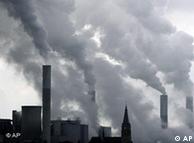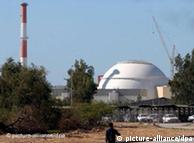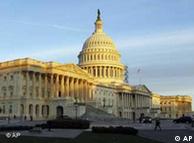INTERNATIONAL RELATIONS | 04.11.2010
US political shift: the effects on the wider world
The campaign running up to the US congressional elections was dominated by domestic matters, in particular the economy. Nevertheless, the loss of the House of Representatives for the Democrats is also sure to have an effect on the country’s foreign policy.
 Annette Heuser says the first fault lines are likely to appear over the START treatyThe most important foreign policy decision to be taken in the wake of the midterm US congressional elections is the ratification of the START nuclear disarmament treaty with Russia.
Annette Heuser says the first fault lines are likely to appear over the START treatyThe most important foreign policy decision to be taken in the wake of the midterm US congressional elections is the ratification of the START nuclear disarmament treaty with Russia.
Short of Senate votes
Even before the Democrats registered their losses in the elections, START ratification had not been looking easy with the Democrats falling short of the 67 votes they needed in the Senate. Now it looks distinctly more difficult, said Annette Heuser, director of the Bertelsmann Foundation in Washington.
"It is expected that the Republicans will take the opportunity to use the START treaty as a strategic tool to embarrass the president on foreign policy as well as domestic policy - but also to prove that he has compromised too quickly with the Russians."
The criticism of Republicans, and also of some Democrats, is that the treaty was negotiated too quickly and that it does not sufficiently take into account American interests such as missile defense and the ability to modernize its own nuclear arsenal.
"Obama has two possibilities," said Heuser. "He can buy agreement to the START treaty with compromises in other areas of policy, or implement it without ratification. However, that would require an agreement with the Russians."
Political capital from Afghanistan
In contrast, the president is not dependent on the agreement of Congress when it comes to Afghanistan policy. If he decides, as planned, to bring the troops home from the summer of 2011, then he is within his rights to do so as commander-in-chief of the army. This could possibly earn him points with the public, said Stephen F. Szabo, who is director of the Transatlantic Academy of the German Marshall Fund in Washington.
 Szabo claims the US public is weary with Afghanistan"The Republicans are against an early withdrawal from Afghanistan," Szabo said. "They would fight against it and would have the military on their side."
Szabo claims the US public is weary with Afghanistan"The Republicans are against an early withdrawal from Afghanistan," Szabo said. "They would fight against it and would have the military on their side."
Obama might then garner support, according to Szabo - the American public being war-weary after years of troop deployment in Iraq and Afghanistan.
For other economic blocs, such as the European Union, the strengthening of the Republicans could have a positive effect, claimed Szabo; at least where free trade is concerned.
"It means there will be less pressure to adopt protectionist measures in the next two years," he said.
Middle East outlook bleak
On the matter of the Middle East peace process, problems were evident even before the election defeats, said Colin Dueck, politics professor at the George Mason University in Fairfax, Virginia. Dueck, the author of a book about Republican foreign policy, said that President Obama has tried to put the Israeli Prime Minister Benjamin Netanyahu under pressure, without success. The result has been a stalemate and lack of confidence in the peace process.
"The view of most Republicans is quite simple," said Dueck. "They support Israel and see it as part of the war on terror."
 Soild movement on climate change appears unlikelyObama is also on a collision course with the Republicans on this. However, this time he will not be able to make to make political capital unless a change comes about from within the region itself.
Soild movement on climate change appears unlikelyObama is also on a collision course with the Republicans on this. However, this time he will not be able to make to make political capital unless a change comes about from within the region itself.
Experts are agreed that the closure of the Guantanamo Bay detention facility will still be pursued by the government, but that it no longer has any priority. It has disappeared from the agenda for public debate and, even among Democrats, is controversial.
No way ahead on climate change
The chances of comprehensive climate change legislation are now almost completely non-existent. The president himself admitted as much on the day after the elections.
"There are a lot of Republicans that ran against the energy bill that passed in the House last year," Obama said. "And so it's doubtful that you could get the votes to pass that through the House this year or next year or the year after."
It was the first time in the one-hour press conference that Obama raised a subject that was of significance abroad.
 Republicans are likely to press for tougher sanctions over the Iran nuclear disputeWith regard to the nuclear dispute with Iran, Dueck expects that the Republicans will push Obama to increase pressure on the Iranian administration and to adopt new, stricter sanctions - possibly on a unilateral basis.
Republicans are likely to press for tougher sanctions over the Iran nuclear disputeWith regard to the nuclear dispute with Iran, Dueck expects that the Republicans will push Obama to increase pressure on the Iranian administration and to adopt new, stricter sanctions - possibly on a unilateral basis.
The conservative wing of the Republican Party believes in particular that President Obama is weak on national security policy, said Dueck, who expects they will put him under pressure on a range of issues.
Good cop, bad cop?
In international negotiations, Obama could use this to his advantage and play an international role of "good cop, bad cop," Dueck says.
He could argue that, while he might personally be ready to make concessions on the global stage, he would also have to consider the views of Congress in Washington. This could provide Obama with greater international influence according to Dueck.
Whether he does choose to act this way or not, of course, remains to be seen.
Author: Christina Bergmann (rc)
Editor: Chuck Penfold


No comments:
Post a Comment